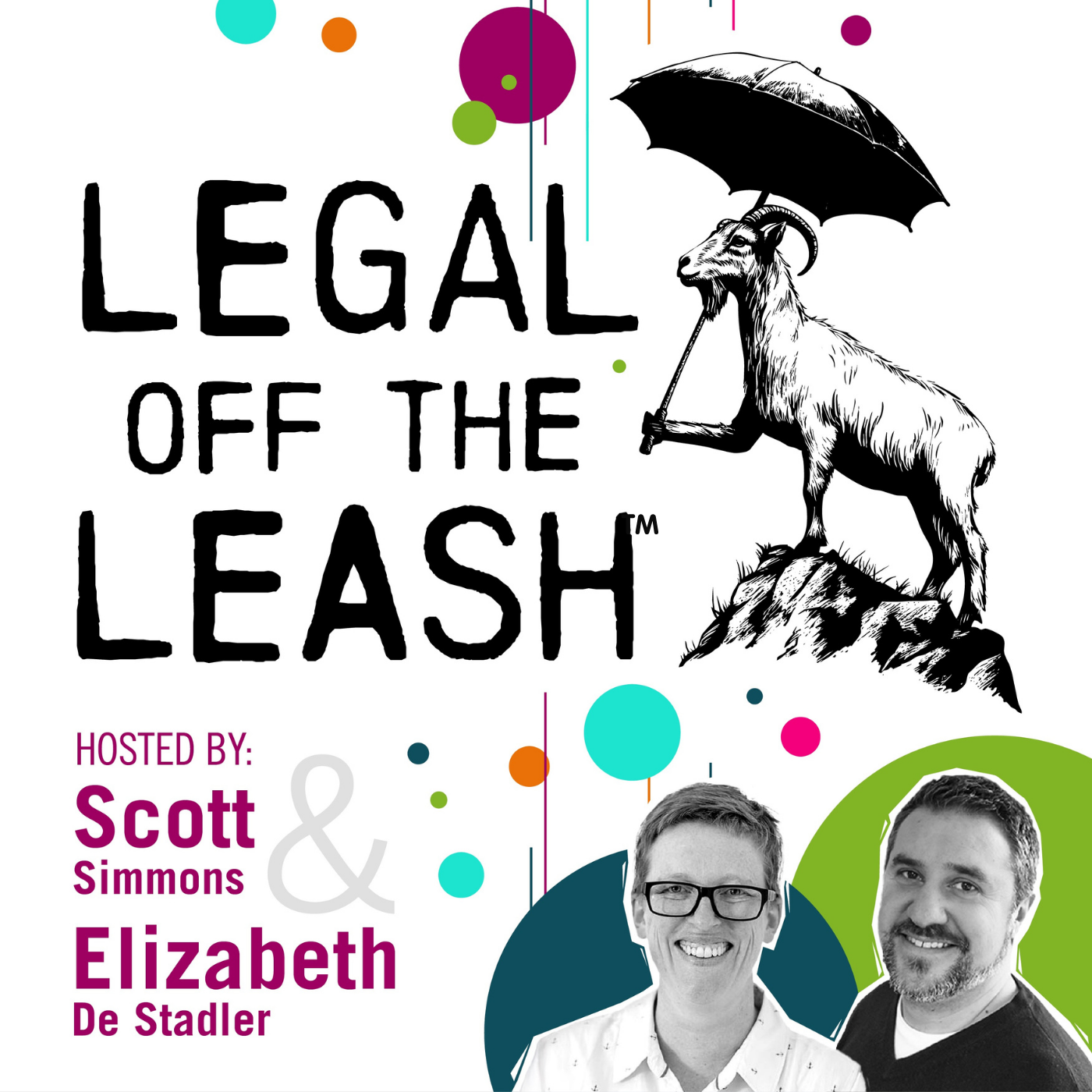Legal Off the Leash
Podcast Description
Hi, and welcome to Legal off the Leash, with your hosts, Elizabeth de Stadler and Scott Simmons.
Why are we doing this podcast?
We want to help create a legal profession filled with successful and happy lawyers.
Because we know lawyers are unhappy. And while most firms care about unhappy lawyers who leave, they should be just as worried about the ones who are staying. Presenteeism, or what some people call quiet quitting, costs the global economy about 9% of Global GDP. That is USD8.8 trillion. If the global legal market is USD797 billion, that means lawyers are pissing away [Elizabeth, where’s the calculator!]... ahem, a lot of money.
Lawyers are bombarded with information about how to make themselves, their firms and their lives better. At the best of times it is just too earnest, at worst it is bewildering. In Legal Off The Leash we cut through the crap and talk honestly with a vast array of people who are cleverer than us about law, life, laughter and line dancing. We don’t talk about line dancing, but we do talk far too much about Harry Potter.
This podcast is about Elizabeth and Scott tearing each other new ***holes and interviewing guests about how to make firms and lawyers better and happier. It is a must-listen for any lawyer who isn’t a malignant narcissist. Actually they’re welcome too.
Podcast Insights
Content Themes
The podcast focuses on themes relevant to the legal profession such as mental health, workplace happiness, and innovative practices. Notable episode topics include purpose beyond profit, human-centered law, and the detrimental impact of billable hours. Episodes feature actionable takeaways like adopting giving models and reframing the purpose of legal work.

Hi, and welcome to Legal off the Leash, with your hosts, Elizabeth de Stadler and Scott Simmons.
Why are we doing this podcast?
We want to help create a legal profession filled with successful and happy lawyers.
Because we know lawyers are unhappy. And while most firms care about unhappy lawyers who leave, they should be just as worried about the ones who are staying. Presenteeism, or what some people call quiet quitting, costs the global economy about 9% of Global GDP. That is USD8.8 trillion. If the global legal market is USD797 billion, that means lawyers are pissing away [Elizabeth, where’s the calculator!]… ahem, a lot of money.
Lawyers are bombarded with information about how to make themselves, their firms and their lives better. At the best of times it is just too earnest, at worst it is bewildering. In Legal Off The Leash we cut through the crap and talk honestly with a vast array of people who are cleverer than us about law, life, laughter and line dancing. We don’t talk about line dancing, but we do talk far too much about Harry Potter.
This podcast is about Elizabeth and Scott tearing each other new ***holes and interviewing guests about how to make firms and lawyers better and happier. It is a must-listen for any lawyer who isn’t a malignant narcissist. Actually they’re welcome too.
Welcome to Legal Off The Leash, the podcast where we take the legal profession out of the box and into a happier, more fulfilling future!
In episode 12, we’re back—candid, chaotic, and deeply human. After a short break, they reflect on Christmas, the realities of therapy and mental health, and why empathy matters more than ever in law. What begins as a light-hearted catch-up turns into a powerful conversation about catastrophising, client behaviour in the age of AI, and how lawyers can learn from medical professionals when it comes to trust, reassurance, and communication. This episode sets the tone for 2026—and for a profession ready for a do-over.
🔑 Key Themes
- Returning with intention: pauses, rest, and reflection matter
- Catastrophising vs clarity—what lawyers can learn from healthcare professionals
- Therapy, self-awareness, and emotional intelligence as professional skills
- Clients, AI, and the danger of judgment instead of empathy
- The shift from “hard skills” to human skills in the age of automation
- Letting go of rigid goals and holding ambition lightly
💬 Memorable Quotes
“Everybody should get therapy. And it’s not because you think something’s wrong or because there’s something wrong. It’s for anybody.” — Scott
“You don’t cure depression, depression cures you.” — Elizabeth
“When you catastrophise, you lose like, I think it was 20 IQ points.” — Elizabeth
“You can sit there and be frustrated about the fact that people are going online, or you can understand and accept that this is the world we’re living in.” — Scott
“Hold your goals lightly.” — Elizabeth
📌 Important Insights & Actionable Takeaways
- Empathy beats expertise alone: Clients who arrive with Google, AI, or half-formed conclusions aren’t being difficult—they’re anxious. Meeting that anxiety with empathy builds trust faster than dismissing clients as diffilcult.
- Therapy builds better professionals: Self-awareness improves communication, leadership, and resilience—not just personal wellbeing.
- AI doesn’t remove the human role: Clients often ask the wrong questions. The lawyer’s value lies in diagnosis, framing, and reassurance.
- Human skills are the differentiator: As technical tasks become automated, connection, confidence, and clarity become core professional assets.
- Goals are fine, attachment isn’t: Focus on process, not perfection. Growth comes from consistency and kindness, not self-judgment.

Disclaimer
This podcast’s information is provided for general reference and was obtained from publicly accessible sources. The Podcast Collaborative neither produces nor verifies the content, accuracy, or suitability of this podcast. Views and opinions belong solely to the podcast creators and guests.
For a complete disclaimer, please see our Full Disclaimer on the archive page. The Podcast Collaborative bears no responsibility for the podcast’s themes, language, or overall content. Listener discretion is advised. Read our Terms of Use and Privacy Policy for more details.